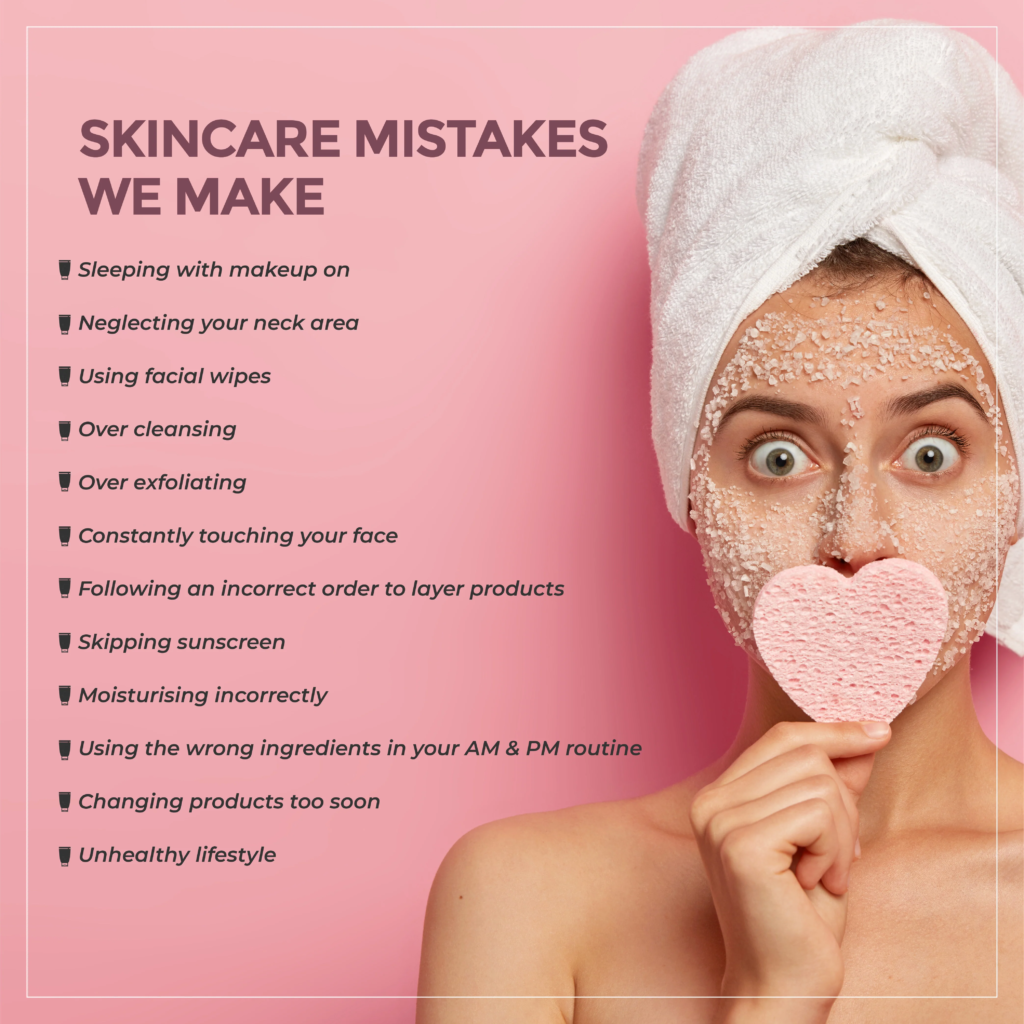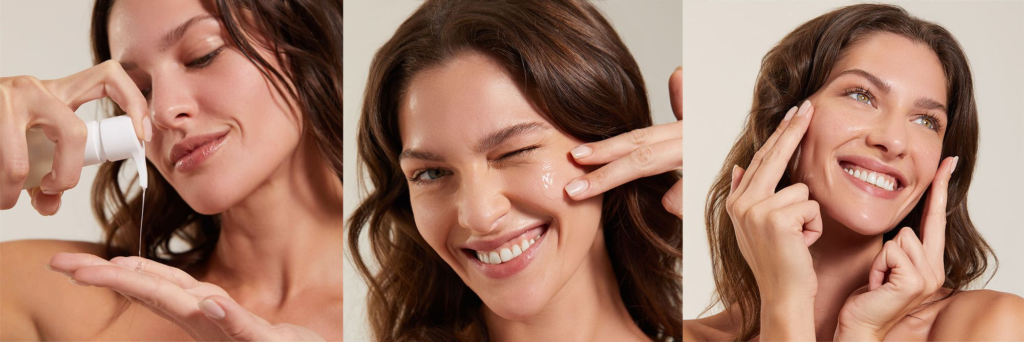Table of Contents
Introduction
Understanding the common skincare mistakes many of us make can be the key to achieving and maintaining healthy, glowing skin. Despite our best efforts, certain habits or choices in our skincare routines may inadvertently cause more harm than good. This article will guide you through the most frequent skincare mistakes and provide practical tips on how to avoid them. By refining your routine, you can ensure that your skincare efforts are as effective as possible.
Why should you read this article?
- Identify Common Mistakes: Learn about the skincare habits that might be sabotaging your routine.
- Enhance Your Routine: Discover actionable tips to improve your skincare regimen.
- Protect Your Skin: Avoid potential skin damage by understanding what not to do.

Frequent Mistakes in Skincare Routines
Over-Exfoliating
- What It Is: Over-exfoliating occurs when you use exfoliants too often or choose ones that are too harsh for your skin. This can strip away the skin’s natural oils, leading to irritation and sensitivity.
- Why It Matters: The skin barrier can become compromised due to over-exfoliation, resulting in dryness, redness, and even breakouts. A damaged skin barrier is less effective at protecting your skin from environmental stressors and retaining moisture.
- How to Avoid It: Limit exfoliation to 1-2 times per week, depending on your skin type. Choose gentle exfoliants like mild chemical exfoliators or physical scrubs with small, rounded particles. Always follow up with a moisturizer to restore hydration.
Skipping Sunscreen
- What It Is: Failing to apply sunscreen daily, whether it’s sunny, cloudy, or you’re staying indoors, is a common mistake. UV rays are present year-round and can penetrate windows, causing skin damage even when you’re inside.
- Why It Matters: Without sunscreen, your skin is vulnerable to UV radiation, which accelerates premature aging, causes hyperpigmentation, and increases the risk of skin cancer. Daily sunscreen use is crucial for maintaining youthful, healthy skin.
- How to Avoid It: Make sunscreen a non-negotiable part of your morning routine. Apply a broad-spectrum sunscreen with at least SPF 30 as the final step in your skincare routine, just before makeup. Reapply every two hours if you’re spending time outdoors.
Using Too Many Products
- What It Is: Layering too many skincare products can lead to overloading your skin, causing irritation or adverse reactions. The skin can only absorb so much, and using too many active ingredients can overwhelm it.
- Why It Matters: An excessive number of products can result in clogged pores, breakouts, and reduced effectiveness of active ingredients. Some products may counteract each other, diminishing their overall benefits.
- How to Avoid It: Simplify your routine by focusing on a few high-quality products that address your primary skin concerns. It’s often better to use a consistent, streamlined regimen than to apply multiple products that might not work well together.
Not Removing Makeup Properly
- What It Is: Going to bed without thoroughly removing makeup is a common mistake that can lead to skin issues. Even if you cleanse your skin, leftover makeup can linger, causing long-term damage.
- Why It Matters: Makeup residues can clog pores, leading to acne, dullness, and even accelerated aging. Proper makeup removal is essential to maintaining clear, healthy skin.
- How to Avoid It: Implement a double cleansing routine in the evening. Start with a makeup remover, like micellar water or an oil-based cleanser, to dissolve makeup. Follow with a gentle cleanser to remove any remaining impurities.
Ignoring Your Neck and Décolletage
- What It Is: Many people focus solely on facial skincare and neglect their neck and décolletage. These areas are just as prone to aging, yet they often receive less attention.
- Why It Matters: The skin on the neck and chest is delicate and can show signs of aging, such as wrinkles and sagging, even before the face does. Consistent care is essential for these areas to maintain a youthful appearance.
- How to Avoid It: Extend your skincare routine to include your neck and chest. Apply the same products you use on your face, such as serums, moisturizers, and sunscreen, to these areas to keep them protected and nourished.
Applying Products in the Wrong Order
What It Is: Applying skincare products in a random order without considering their texture and absorption properties.
Why It Matters: The effectiveness of skincare products can be reduced if not applied in the correct order, potentially blocking active ingredients from penetrating the skin.
How to Avoid It: Always start with the lightest products (like serums) and end with the heaviest (like creams and oils).
Using Expired Products
What It Is: Continuing to use skincare products past their expiration date.
Why It Matters: Expired products can lose their effectiveness and even cause irritation or infections.
How to Avoid It: Regularly check expiration dates and discard any products that are out of date or have changed in texture, color, or smell.
Skipping Patch Tests
What It Is: Not testing new skincare products on a small area of skin before applying them to your face.
Why It Matters: Skipping a patch test can lead to allergic reactions or irritations, especially with products containing active ingredients.
How to Avoid It: Always do a patch test on a small area of skin, such as the inside of your wrist, before using a new product on your face.
Ignoring Diet and Hydration
What It Is: Focusing solely on topical skincare and neglecting the importance of diet and hydration.
Why It Matters: What you consume affects your skin’s health; poor diet and dehydration can lead to dullness, breakouts, and other skin issues.
How to Avoid It: Maintain a balanced diet rich in fruits, vegetables, and water, complementing your skincare routine with proper nutrition.

Tips for Improving Your Skincare Routine
Consistency Is Key
- What It Is: Maintaining a daily skincare routine without skipping any steps.
- Why It Matters: Consistency is crucial for achieving and maintaining healthy skin. It allows your products to work effectively over time, ensuring that you see lasting results.
- How to Implement: Develop a routine that is both effective and manageable. Start with the basics—cleanser, moisturizer, and sunscreen—then gradually add treatments as needed. Set a specific time each day for your routine to build a habit, ensuring you never miss a step.
Patch Test New Products
- What It Is: Testing a small amount of a new product on a discreet area of skin before full application.
- Why It Matters: Patch testing helps to prevent adverse reactions, which is particularly important for sensitive or acne-prone skin. It can save your skin from potential irritation or allergic reactions.
- How to Implement: Apply a small amount of the product behind your ear or on your wrist, and wait 24-48 hours to check for any signs of irritation, redness, or breakouts. If the area remains clear, the product is likely safe for use on your face.
Hydrate Inside and Out
- What It Is: Ensuring your skin stays hydrated by drinking water and using moisturizing skincare products.
- Why It Matters: Proper hydration is essential for maintaining skin elasticity, reducing the appearance of fine lines, and supporting overall skin health. Hydration helps your skin look plump, smooth, and youthful.
- How to Implement: Aim to drink at least 8 glasses of water daily to keep your body and skin hydrated from the inside out. Incorporate hydrating serums, such as those with hyaluronic acid, and follow up with a good moisturizer to lock in moisture. Don’t forget to apply a hydrating mask weekly for an extra boost.
Adjust for Seasons
- What It Is: Tailoring your skincare routine to meet the changing needs of your skin throughout the different seasons.
- Why It Matters: Your skin’s needs fluctuate with the seasons; what works in one season may not be suitable in another. For example, winter often requires richer, more hydrating products, while summer calls for lighter, oil-free formulations.
- How to Implement: In winter, switch to thicker moisturizers, and consider adding a hydrating serum to combat dryness. In summer, opt for lightweight, non-comedogenic products and ensure you’re using a broad-spectrum sunscreen daily. Reevaluate your skincare products at the start of each season and adjust accordingly.
Listen to Your Skin
- What It Is: Observing how your skin reacts to products and making adjustments based on its current condition.
- Why It Matters: Skin changes over time due to factors like age, climate, stress, and diet. A routine that once worked may become less effective or even harmful.
- How to Implement: Pay close attention to how your skin feels and looks. If you notice dryness, breakouts, or irritation, it may be time to tweak your routine. Introduce one new product at a time, so you can easily identify what works and what doesn’t. Be flexible and willing to change your routine as needed.
By incorporating these tips into your skincare routine, you can avoid common mistakes and ensure that your skin remains healthy, glowing, and resilient. A well-planned routine, combined with the right products and habits, will help you achieve and maintain your skincare goals.

Conclusion
Crafting a skincare routine tailored to your needs and avoiding common pitfalls is essential for achieving and maintaining healthy, glowing skin. By being consistent, listening to your skin, and making adjustments as needed, you can significantly improve the effectiveness of your skincare regimen. Remember, the key to radiant skin lies not only in the products you use but also in how you use them and the awareness you bring to your skincare practices.
Highlighted Key Points:
- Consistency in your skincare routine ensures long-term benefits.
- Patch testing new products prevents adverse reactions, especially for sensitive skin.
- Hydration is crucial, both internally and externally, to maintain skin health.
- Seasonal adjustments in your skincare routine help cater to your skin’s changing needs.
Key Takeaways:
- Avoid common skincare mistakes like over-exfoliating and skipping sunscreen.
- Simplify your routine by focusing on quality products and consistent application.
- Regularly evaluate your skin’s needs and adapt your routine accordingly.
By following these guidelines, you can avoid common mistakes and build a skincare routine that truly enhances your skin’s natural beauty.
